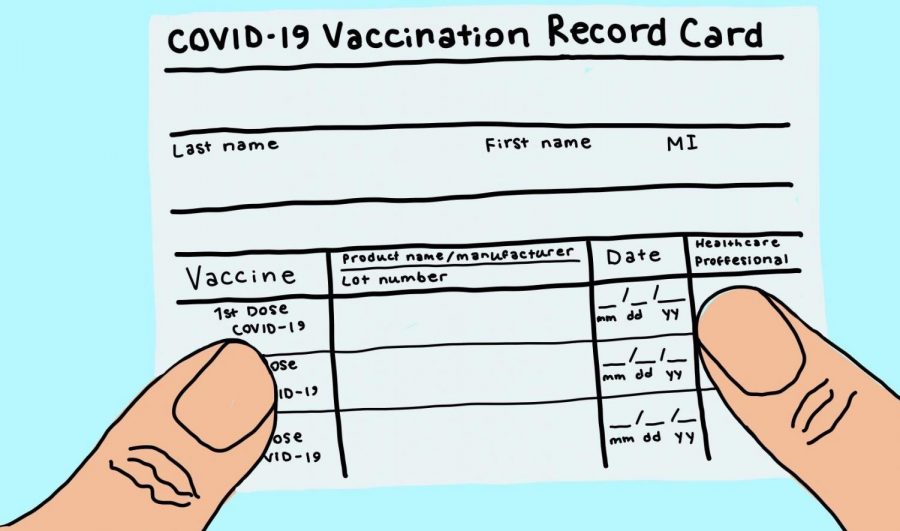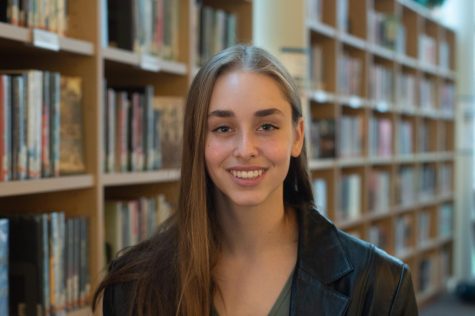Following an Anti-Vaccine Protest at Portland Public Schools Board Meeting, Students Share Their Thoughts
La Salle’s administration announced at the beginning of the school year that 80% of the student body was fully vaccinated.
November 10, 2021
After anti-mandate protesters dominated a Portland Public Schools board meeting on Oct. 26, the PPS board had no choice but to switch to a virtual meeting format, also forcing them to postpone their discussion about potentially implementing a vaccine mandate.
Several demonstrators at the meeting would not put on a mask, despite officials requesting them to do so multiple times, which breaks the current laws in Oregon regarding COVID-19.
Many of these demonstrators were a part of People’s Rights, an extremely conservative organization started by Ammon Buddy, an anti-government activist.
45 minutes after the meeting was postponed and replanned to take place virtually, a large group of anti-mandate protesters remained in the building, attempting to protest a proposed vaccine mandate for the school district. The demonstrators then set up the chairs in the lobby of the building to have their own meeting.
On Nov. 16, the PPS board is scheduled to vote on the COVID-19 vaccine mandate.
There are many opinions on this topic, and people in the school district continue to exercise their First Amendment right to protest their beliefs and disagreements. Many of La Salle’s students have expressed a range of emotions regarding the idea of a vaccine mandate at La Salle, as well as the fact that we do not currently have one in place.
Senior Natalie Rask takes a stance more on the pro-vaccine side, as she believes that a vaccine mandate that would apply to schools in Oregon is “a good idea.”
“I think La Salle tries really hard to make life seem as normal as possible during COVID, so getting the vaccine for all the students at La Salle, so for kids whose parents might not let them at home and they want to get it, I think it’s a great way to bring the community together and to help these people that are less fortunate get the vaccine,” Rask said.
Rask also voiced that she thinks “the vaccine as a whole has become so political, between Democrats and Republicans, instead of seeing it like a flu shot or something that’ll help society,” she said.
Freshman Abraham Scales believes that vaccines should not be mandated for students. “I feel it is completely unconstitutional to force vaccinations on people, especially in a work environment,” he said.
While Scales believes that the vaccine should be approached with precautions, he also does not necessarily agree with how the anti-mandate members of the PPS board went about protesting the vaccine mandate at the meeting last week.
“Protests have to be peaceful, they can’t break the law,” he said, referring to the anti-mandate protesters at the meeting refusing to use a face covering. “Whether or not we agree with what the governor is putting in place, we still have to follow that because, I mean, she was elected our governor, and she is who makes the decisions.”
Scales said he respects other people’s opinions on this issue, but he remains firm in his beliefs that the vaccine should not be mandated. “I don’t want to push my opinions on other people,” he said. “It’s just personally, if I had a child, I would not have them vaccinated for COVID-19.”
Sophomore Austin Stephens believes that the vaccine is safe, but he said that he could understand where concerns regarding the vaccine are coming from.
“But I do think that to a certain extent, once again, they do have the right to protest that,” Stephens said, referring to the vaccine. “And it’s [a] really controversial thing because you have your rights to do whatever you want to do, but I do think that getting the vaccine would be the best option.”
Sophomore Dawson Stroud says that “in theory,” the potential of an Oregon school vaccine mandate is “good,” but it is “very logistically complicated,” he said.
“If 10 percent of students refused to get [vaccinated] and become homeschooled or whatnot, then that risk to their education I think kind of outweighs the required safety schools will get,” Stroud said.
“I think a mandate would just create more — as much as it might help public safety — it’d create more conflict, and this [would] kind of make the situation worse,” Stroud said.
The possibility of a vaccine mandate at schools throughout the nation will continue to be a hot subject of debate in the months and possibly years to come. Parents, students, and concerned citizens will undoubtedly continue to exercise their right to free speech, assembly, and protest until a consensus regarding COVID-19 vaccines in schools has been reached.





